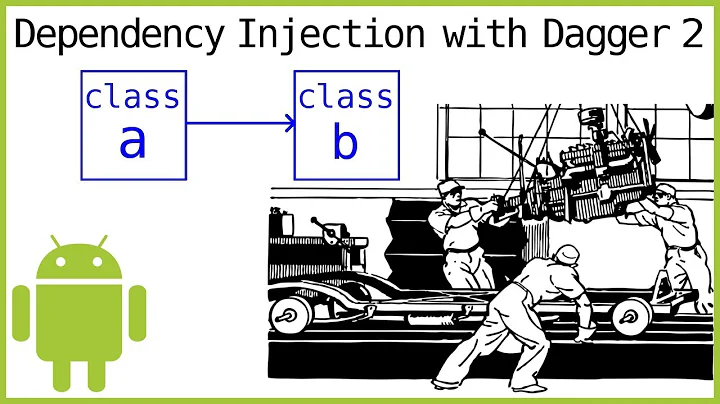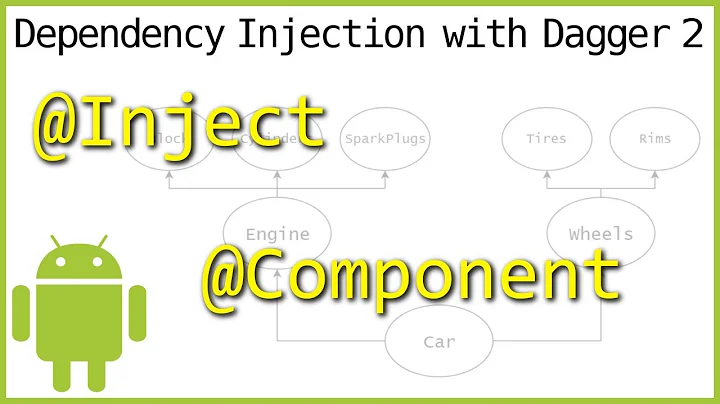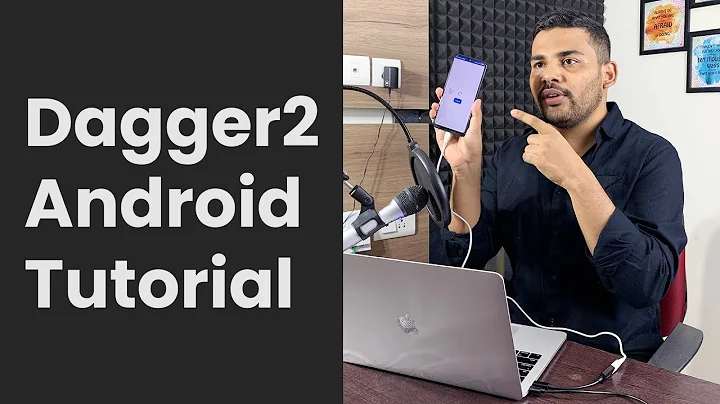Dagger2 - null instead of injected object
Looks like you need to build your component as in:
component = Dagger_ MainComponent.builder()
.mainModule(new MainModule())
.build();
Typically, you do this in the onCreate method of your Application.
One good resource that may help you is the example apps in the Dagger 2 repo.
I also found this PR helpful, from a suggested update to Jake Wharton's u2020 sample app (from the main Dagger 2 Engineer). It gives a good overview of the changes you need to make when going from Dagger 1 to 2 and, apparently that's what he points people to as well.
Related videos on Youtube
Comments
-
 slnowak about 2 years
slnowak about 2 yearsFor making things simple, suppose I want to inject EmailValidator from apache validators into my activity:
public class MainActivity extends FragmentActivity { @Inject EmailValidator emailValidator; @Override protected void onCreate(Bundle savedInstanceState) { super.onCreate(savedInstanceState); setContentView(R.layout.activity_main); }I have a MainModule class:
@Module public class MainModule { @Provides public EmailValidator providesEmailValidator() { return EmailValidator.getInstance(); } }and MainComponent interface:
@Singleton @Component(modules = MainModule.class) public interface MainComponent { EmailValidator getEmailValidator(); }When trying to use my validator in activity, I'm getting a nullpointer exception:
java.lang.NullPointerException: Attempt to invoke virtual method 'boolean org.apache.commons.validator.routines.EmailValidator.isValid(java.lang.String)' on a null object referenceObviously I'm missing something. I know that dagger creates component implementation for me. Should I use it? How?
If I do the following in my onCreate method:
emailValidator = Dagger_MainComponent.create().getEmailValidator();then everything works fine.
But I want to be able to use @Inject annotation anywhere (probably on setter/constructor instead of a field) instead.
What am I missing?
I did something similar with dagger1 and it worked. Of course I needed to call
ObjecGraph.inject(this)in activity. What's the dagger2 equivalent?EDIT:
Ok, so I've found a solution. If anyone will ever have such a problem, there are some snippets:
1) I've created an application class:
public class EmailSenderApplication extends Application { private MainComponent component; @Override public void onCreate() { super.onCreate(); component = Dagger_MainComponent .create(); component.inject(this); } public MainComponent component() { return component; } }2) In AndroidManifest.xml:
<application android:name=".EmailSenderApplication" ...3) And finally, in the activity class where I want to inject some components those two ugly as hell lines:
component = ((EmailSenderApplication) getApplication()).component(); component.inject(this); -
 slnowak over 9 yearsI figured it out. Because of useful links, I'm accepting this answer :)
slnowak over 9 yearsI figured it out. Because of useful links, I'm accepting this answer :) -
gMale over 9 yearsGlad you got it fixed! From your edits above, it looks like you had a case where none of your module constructors require constructor arguments. When that's true, the component will have a
createmethod for you to use instead. Chances are though, after a while, you will need to pass your application in to one of those modules and when that happens, you'll have to fall back to using the builder as described, above. -
 slnowak over 9 yearsYeah, I know about it, but thanks. ;) The missing part Was component.inject(this)
slnowak over 9 yearsYeah, I know about it, but thanks. ;) The missing part Was component.inject(this) -
fakataha over 9 yearsCould anyone explain why this is? I corrected this in my app through trial and error but don't quite see the reasoning. In my case, I had an activity that built the component and injected itself. Then a Controller would have been injected to the Activity but was always null until I made another inject into the Component with the Controller as a param.
-
gMale over 9 yearsIn my case, I have injected dependencies in my application object so I must inject. Your case sounds different but the good news is, since the code is generated, you can just trace through the particular
injectcall that you're asking about in the IDE and see exactly why it's needed. -
 Accountant م over 5 yearsfirst link is broken, is there any replacement for it ?
Accountant م over 5 yearsfirst link is broken, is there any replacement for it ?
![[Android Tutorial] Bài 10 - Tìm hiểu về thư viện Dagger 2 ( Phần 1 )](https://i.ytimg.com/vi/4WReBnBm3EU/hq720.jpg?sqp=-oaymwEcCNAFEJQDSFXyq4qpAw4IARUAAIhCGAFwAcABBg==&rs=AOn4CLAZfCyE5MdcpYW523LpvTmaGdeORQ)
![🔪 Dagger2 Course [#2] - @Component & @Inject](https://i.ytimg.com/vi/sZVXFgpte68/hq720.jpg?sqp=-oaymwEcCNAFEJQDSFXyq4qpAw4IARUAAIhCGAFwAcABBg==&rs=AOn4CLDIhUbu8ADC72ZMh6tk_Ql0flMa5g)






